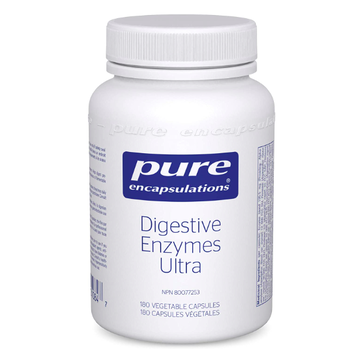Should you Take Digestive Enzymes?
Dr. Erica Volk, ND
**A note to my readers: If you're frustrated by your digestive symptoms, please join my FREE Gut Lovers Society (on Facebook) where you'll gain exclusive access to videos, education, information, tips, and live Q&A with me––all designed to help you optimize your gut health.
Digestive enzymes: magic solution or waste of money?
"Should I take digestive enzymes" is a question I get a lot! I remember when I first started looking for solutions for my chronic irritable bowel syndrome symptoms. Digestive enzymes were one of the first treatments recommended to me by friends who also had digestive symptoms. At the time, I went down the health food store (like so many of my readers and patients) and bought myself a bottle of digestive enzymes. But were they right for me, and are they right for you? Let's get into it!
What are digestive enzymes?
In a normal, healthy person, the pancreas makes enzymes that are released into the stomach to help digest our food. Enzymes break our food down into tiny bits that we can easily digest and absorb. Our pancreas makes several key digestive enzymes:
- Amylase: helps break down our starch and carbohydrates into digestible simple sugars
- Lipase: helps break down the fats we eat into digestible fatty acids
- Protease: helps break down the protein we eat into digestible amino acids
If our pancreas does not produce these enzymes sufficiently, then we can run into trouble digesting our food properly. Poorly digested foods can putrefy and ferment in the gut, leading to gas, bloating, abdominal pain, cramping, and irregular bowel habits or difficulty with stools. These undigested bits of food can also create issues for people with diverticulosis or diverticulitis. It makes sense digestive enzymes are so common since improving digestion from the moment we eat can help prevent many digestive problems!
How do I know which digestive enzyme supplement is right for me?
First of all, it's helpful to find out if digestive enzymes are even needed in the first place. If your pancreas is producing the enzymes you need, then taking a digestive enzyme supplement might not be all that helpful.
The pancreas makes digestive enzymes in their inactive form (ie. turned "off"). In order to function properly, these enzymes need to be activated (ie. turned "on"). The key ingredient needed to activate our enzymes is our stomach acid. Many people do not have enough juices of digestion in the stomach to activate the enzymes their pancreas makes. In someone who is making pancreatic enzymes just fine but not activating them well, what they may actually need is support with their stomach acid.
The pancreas makes digestive enzymes in their inactive form (ie. turned "off"). In order to function properly, these enzymes need to be activated (ie. turned "on"). The key ingredient needed to activate our enzymes is our stomach acid. Many people do not have enough juices of digestion in the stomach to activate the enzymes their pancreas makes. In someone who is making pancreatic enzymes just fine but not activating them well, what they may actually need is support with their stomach acid.
There are many commercially-available digestive enzyme formulas and their contents vary... a lot! Some contain a laundry list of different enzymes (usually these are words ending in "-ase") and some contain just a few. Some contain stomach acid support (usually "betaine hydrochloric acid") and some do not. Some are vegan and some are not.
|
When it comes to selecting supplements, the best advice I can offer is to work with a health care provider who can help determine the right treatment for you based on your symptoms, food triggers, and other digestive health problems like low stomach acid and infections. I was amazed to find out how easy it was to resolve my digestive symptoms when I finally found out what was actually wrong with me. I could have saved myself a lot of money on unnecessary supplements if I had figured this out sooner!
|
If you prefer to try to treat your symptoms yourself, using a digestive enzyme supplement that contains a broad variety of enzymes can cover more bases. The potential risk of taking a more comprehensive formula is that there are more ingredients you could potentially react to!
In addition, potency and dose matter. For example, if a person needs a lot of lactase enzyme (the enzyme that digests lactose in dairy products) and nothing else, they would find that a high-potency lactase-only enzyme formula is much more effective than using a whole bunch of other enzymes they don't need. In this example, a comprehensive formula containing just a small amount of lactase might not improve their symptoms sufficiently and they might wrongly conclude the digestive enzymes don't work. In other people who need more broad-spectrum support, comprehensive formulas can work really well!
If trying an enzyme formula for the first time, a broad-spectrum digestive enzyme that does not contain ox bile or betaine hydrochloride is what I recommend. On the ingredients label, look for enzymes like amylase, lipase, lactase, protease, cellulase, alpha-galactosidase, and more (all words ending in "-ase"). Those without a gallbladder may find the addition of ox bile is very helpful. Those with low stomach acid (called "hypochlorhydria") may find that the addition of betaine HCl is helpful.
For many people, the relatively low cost of trying one or more enzyme formulas is still worthwhile and they may find a treatment that improves their symptoms significantly. If in doubt, I recommend discussing the topic with a licensed and regulated health care provider.
In addition, potency and dose matter. For example, if a person needs a lot of lactase enzyme (the enzyme that digests lactose in dairy products) and nothing else, they would find that a high-potency lactase-only enzyme formula is much more effective than using a whole bunch of other enzymes they don't need. In this example, a comprehensive formula containing just a small amount of lactase might not improve their symptoms sufficiently and they might wrongly conclude the digestive enzymes don't work. In other people who need more broad-spectrum support, comprehensive formulas can work really well!
If trying an enzyme formula for the first time, a broad-spectrum digestive enzyme that does not contain ox bile or betaine hydrochloride is what I recommend. On the ingredients label, look for enzymes like amylase, lipase, lactase, protease, cellulase, alpha-galactosidase, and more (all words ending in "-ase"). Those without a gallbladder may find the addition of ox bile is very helpful. Those with low stomach acid (called "hypochlorhydria") may find that the addition of betaine HCl is helpful.
For many people, the relatively low cost of trying one or more enzyme formulas is still worthwhile and they may find a treatment that improves their symptoms significantly. If in doubt, I recommend discussing the topic with a licensed and regulated health care provider.
How to use digestive enzymes
|
Many people take digestive enzyme supplements incorrectly. Digestive enzymes help break down our food so they should be taken with meals. Taking a digestive enzyme at a dose of 1 capsule daily kind of misses the whole point. These are designed to be digestive aids so they are generally taken as 1-2 capsules with each meal (preferably before you start eating or at the beginning of the meal as opposed to after the meal is finished). |
Using enzymes to reduce inflammation
Did you know that enzymes can also be used to reduce inflammation? In fact, healthcare practitioners sometimes recommend enzymes for conditions where there is too much inflammation, like osteoarthritis.
In these instances, enzymes are usually taken between meals, and different kinds of enzymes are taken. We refer to this class of enzymes as "proteolytic enzymes." Bromelain, a compound in pineapple, is one example of an enzyme that is often used to reduce inflammation.
In these instances, enzymes are usually taken between meals, and different kinds of enzymes are taken. We refer to this class of enzymes as "proteolytic enzymes." Bromelain, a compound in pineapple, is one example of an enzyme that is often used to reduce inflammation.
In fact, taking bromelain with meals can help reduce digestive symptoms for people in a couple of ways: first, by helping to digest our food better, and second, by reducing inflammation in the digestive system.
Other common proteolytic enzymes used for inflammation include chymotrypsin, trypsin, and serratiopeptidase. These enzymes are often used for inflammatory conditions but are not generally used to aid digestion.
If exploring using enzymes for inflammation, I recommend working with a health care provider.
Are there lab tests that can determine if digestive enzymes are right for me?
There are a few lab tests that can help determine whether your pancreas is functioning optimally.
Through blood testing, your doctor can assess your pancreas function by measuring your lipase and amylase levels.
Abnormal levels of a marker called "elastase" in the stool can indicate your pancreas may not be functioning properly. This is something I commonly evaluate in my patients.
Imaging studies like abdominal ultrasounds and CT scans can also indicate problems with the pancreas.
Through blood testing, your doctor can assess your pancreas function by measuring your lipase and amylase levels.
Abnormal levels of a marker called "elastase" in the stool can indicate your pancreas may not be functioning properly. This is something I commonly evaluate in my patients.
Imaging studies like abdominal ultrasounds and CT scans can also indicate problems with the pancreas.
Final words about digestive enzymes
While taking digestive enzymes can sometimes improve digestive symptoms, many of the people who ultimately decide to work with me and who have self-prescribed digestive enzymes don't actually need them.
In many cases, running a few lab tests helps us determine an underlying infection or food sensitivity that can be treated. When we address the real issue, symptoms improve without the need for long-term use of supplements.
While buying a bottle of digestive enzymes is a fairly low-cost and low-risk treatment to try (and it can really help in some people), we need to weigh the cost of filling our medicine cabinet with trendy or "possibly-helpful" supplements versus the cost of paying to work with a health professional who can figure out what's actually going on. In many cases, diagnosing the problem early and following a personalized treatment program can save us a lot of money spent on unnecessary and inappropriate supplements, not to mention years of suffering.
In many cases, running a few lab tests helps us determine an underlying infection or food sensitivity that can be treated. When we address the real issue, symptoms improve without the need for long-term use of supplements.
While buying a bottle of digestive enzymes is a fairly low-cost and low-risk treatment to try (and it can really help in some people), we need to weigh the cost of filling our medicine cabinet with trendy or "possibly-helpful" supplements versus the cost of paying to work with a health professional who can figure out what's actually going on. In many cases, diagnosing the problem early and following a personalized treatment program can save us a lot of money spent on unnecessary and inappropriate supplements, not to mention years of suffering.
If you're in BC and looking for a health practitioner who can help you identify the cause of your chronic digestive problems and help you figure out if digestive enzymes are right for you, look no further. I am always accepting new patients and can work virtually with you from anywhere in BC. Those in the Okanagan are invited to work with me in person.
Learn more about working with me or book an appointment by clicking the button below.





